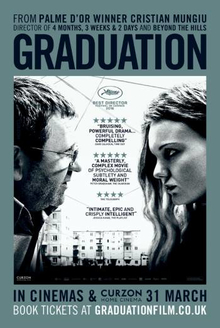As always, it is real pleasure to be immersed in the cinema of a country for the first time, in this case Romania, so long as they are decently made. This one with its slew of honors including ones at Cannes more than qualifies and looks like it’s a brutally assessment of modern Romania. However it also make some directorial decisions that makes it feel oddly paced and ends on a somewhat unsatisfying note.
Eliza is about to graduate from high school and is bound for Cambridge University provided her final exam results hold up. Her father Romeo, a doctor, is especially anxious that she makes it to London so that she does not waste her life as he believes those of his generation in Romania has. However one day before the exams, she is assaulted and almost raped after he drops her off to school. As she is shaken and lightly injured, Romeo fears that this will affect her exams and pulls strings with his network of contacts to get her favorable treatment. Meanwhile he does what he can to identify and catch the criminal who assaulted his daughter and it is revealed that he is having an affair with a teacher in Eliza’s school, Sandra, who has a young son of her own. Romeo is also annoyed that he is being targeted by a vandal and grows resentful of Eliza’s relationship with her boyfriend, especially when she expresses doubts about going abroad to study.
There’s quite a lot going on in this film but everything is interconnected and ties back to the film’s central themes about endemic corruption. The approach taken here is especially effective given that the point of view character is Romeo, a middle-aged man who had once hoped that his home country Romania could become better but has since become embittered. He blames this state of affairs on pervasive crime and corruption, yet when it comes to his daughter’s future, he still falls back on the old boys’ network of which he is a respected member to secure an advantage for her. He justifies this as a one-time indulgence that merely affirms what she already deserves to have anyway by merit alone and yet this is what everyone else who is in on the scheme says as well. The headmaster of the school for example lives in a nice house and when Romeo visits him at home, is at pains to point out that he usually doesn’t do such things and that everything in the house was earned and paid for honestly. Similarly he pushes Eliza to leave, though this means that there is one less bright and principled person who will work for the country’s betterment. Romeo’s individual selfishness could be more clear as he tries to assert his own idea of what is best on the rest of his family against their wishes.
However this film also affects a stylistic choice that feels a little odd. It keep building conflict up to a confrontation but then dodges the climax. An easy example of this is the spate of vandalism that plagues Romeo. The audience naturally suspects Sandra’s son who might be resentful of his mother’s illicit relationship with an older man, but we don’t get any confirmation either way. Then there’s the time he is driving with his daughter and the car seemingly runs into something but we can’t see what it is. Romeo later returns to the scene to search around and weeps when he spots something in the bushes but we don’t see what and nothing else comes of it. There are other examples and it’s hard to see why the director does this. Perhaps they are intentional red herrings or reminders to the audience that problems in real life aren’t resolved through dramatic confrontations? Indeed all of the conflicts in this film either peter out or are left unresolved but then why even try to build up the tension at all? The scene where Romeo seemingly recognizes his daughter while on the bus and gets down to try to find him to no result seems entirely unnecessary.
I’d still consider this as a very strong film despite this flaw. I also like that there is undercurrent of condemnation of the male patriarchy that runs through this film. It’s not a coincidence that the people of authority who are involved in trading favors are all middle-aged men and Romeo is constantly dismissive of what the women in the family actually want, including his own mother’s questions about her medicine. I think this is because director Cristian Mungiu who also wrote the script based it on his own experiences of living in Romania and so the brutal honesty shines through.
